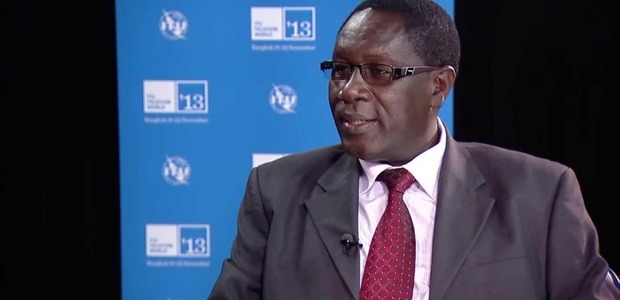advertisement
Six roles for Wangusi as he starts his second term at CA
Today marked the formal introduction of Eng. Francis Wangusi to the industry following his re-appointment as the Director General of…

Today marked the formal introduction of Eng. Francis Wangusi to the industry following his re-appointment as the Director General of the regulator for a term of four years.
Mr. Wangusi, emerged the best in an interview conducted by the Board and which attracted a total of 29 candidates, where six candidates were shortlisted.
Under the Kenya Information and Communication Act (KICA) 2013, the director- general serves for a term of four years renewable once. The DG’s terms and conditions of service are determined by the board in consultation with the Public Service Commission.
advertisement
During his past tenure at the helm of Kenya’s ICT regulatory body over the last three years, Mr Wangusi is credited with leading the process of transformation of the regulator into an independent Authority; facilitating the growth of ICT industry, making ICT assume an increasingly strategic role in the growth of the country’s economy and a major contributor to the country’s GDP.
It is during Mr. Wangusi’s tenure that Kenya’s telecommunications market grew to be rated the 3rd largest in Africa. In the same period Kenya was rated 2nd best among African countries on internet usage.
Here are the six main responsibilities cited to Mr. Wangusi by the Cabinet Secretary Ministry of ICT Dr. Fred Matiang’I:
advertisement
Regulations on Market Dominance by telcos
Mr. Wangusi will be faced with role of ensuring that once the market dominance regulations are in place, the regulations are followed by the telcos to the letter. The sector has already come up with the regulations that will be handed over to the parliament next week. The new regulations will help address the issue of market dominance so as to drive equal growth of the telcos in the sector.
The sector had targeted to have all the regulations out by June but they have to pass this regulations through the Government and parliament approval and that’s why there were some delays. There are 14 sets of regulations which will help cover a number of things which will include management of market dominance.
advertisement
There will also be a set of policies and guidelines the regulator will impose on the players that hold over 50% of the market share. Currently Safaricom has over 70% dominance in the market totally, but this doesn’t mean they are totally dominant in all markets.
Look into the Growth of broadcasting sector
After the successful transition of the country from the Analogue platform to the Digital Platform, the broadcast sector is growing rapidly. In the his new term the Director General will be faced with a role of ensuring that the growth of the broadcast sector will lead to growth of local content. The CS asked the Broadcaster and the regulator to work gradually on this. The CS also asked the DG to work closely with the sector so that they can come up with a broadcasting framework that will help drive growth of local content.
Cyber security
Cyber security is quite a challenge. It is estimated that as a country we lose more than Kshs 2 billion annually but however there are ongoing discussions to help fight cybercrime not only locally but across the region. Currently, the country is hosting the High Level Cyber Security Forum by COMESA. The country also has the Cybersecurity framework in place.
All operators and investors need to work on a secure cyberspace with this in mind, the DG will be faced with the challenge of trying to ensure that the cyber space is a little safer
To ensure more discipline in the sector
The ministry has completed a new policy and spectrum management guidelines and plan to share this with the stakeholders. Once the Guidelines are out, The Director General will be faced with the responsibility of ensuring that the players in the sector will respect the guidelines especially in the new era where the Government is planning to make great use of the spectrum after the successful digital migration.
Ensure effective use of the USF fund
The USF fund was set up close to six years ago to help boost telecommunication infrastructure in the country’s remote areas which are often not considered to be financially viable. Mobile network operators and internet service providers are required by law to remit 0.5 per cent of their annual turnover.
With the fund in place the DG will be faced with the responsibility of ensuring that the fund meets its purpose and different marginalised areas get connected in due time. Current projects proposed under the USF as listed on the Communications Commission of Kenya website include school-based ICT centres, community ICT access points, ICTs for people with disabilities, digitisation of secondary school curriculum, computerisation of health centres and Research and Development.
The fund was established under Section 843 of the Kenya Communications Amendment Act of 2009 which was to be administered by the Communications Authority (CA). The objective was to support the widespread access to, support capacity building and promote innovation in information and communication technology services.
Achieve the Connect 2020 initiative by ITU
This is about the national broadband strategy. This initiative by ITU is all about pushing Broadband across all ITU Member states by 2020. Through the Connect 2020 Agenda ITU Member States committed to work towards the shared vision of “an information society, empowered by the interconnected world, where telecommunication/ICT enables and accelerates socially, economically and environmentally sustainable growth and development for everyone” and invited all stakeholders to contribute with their initiatives and their experience, qualifications and expertise to the successful implementation of the Connect 2020 Agenda. In his new tenure the DG will be faced with the responsibility of making this achievable.